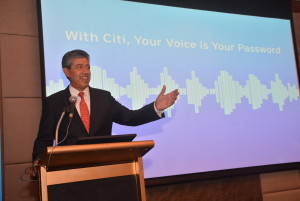In this digital age when consumers increasingly worry over data privacy and electronic fraud, voice biometrics authentication is gaining ground as a key identity authentication tool for financial institutions.
American banking giant Citi, the first financial services firm to deploy voice biometrics authentication across Asia Pacific, announced that it had hit the million milestone in enrolling customers to this process. The milestone was hit two months ahead of target schedule following the regional launch of this scheme in May 2016.
In the Philippines, voice biometrics was launched by Citi in October last year. Now, the bank has over 100,000 enrolled clients in this country.
The voice biometrics authentication capability identifies customers through their voice print – which, similar to a fingerprint – is unique to each person. Clients can opt to enrol by recording their voices, which the bank will use to generate and store their voice prints for matching subsequent calls to Citi. Each voice print is uniquely tagged and cannot be reverse-engineered once stored.
Elsewhere in the region, voice biometrics authentication has also been implemented in Australia, Hong Kong, India, Malaysia, Singapore, Taiwan, Thailand and Vietnam.
“This milestone on voice biometrics authentication capability underscores Citi’s focus on technology to better serve our clients. We are making banking easier for our clients by leveraging digitization and innovation which helps deliver a remarkable client experience. The rapid adoption of mobile and other digital channels has truly transformed how people bank and we are delighted that Voice Biometrics has proved such a hit with our clients,” Anand Selva, Citi head of Asia Pacific consumer banking, said in a press statement.
Using voice biometrics, clients who call into the bank’s contact centers have their identity automatically verified within 15 seconds or less as they explain their reason for calling. This is a reduction from an average time of around 45 seconds currently or 66 percent less time spent verifying their details currently.
Last year, Citi’s consumer banking business in Asia Pacific – that spans 12 of 19 global consumer markets – was transformed into “simpler, dramatically faster, more scalable and far more digital” model. Today, more than half of the bank’s consumer bank clients use digital channels, with mobile being the fastest growing channel with 35 percent growth year-on-year.
One out of every four new credit card accounts are now acquired from digital sources and over 50 percent of the bank’s clients are actively using digital banking channels, up from 30 percent three years ago.
In the Philippines, Citi has introduced a fully digitized credit card application process, where individuals can visit the website at www.citibank.com.ph, complete the form in minutes, upload digitized copies of required documents, and get conditional approval right away. The program assists the user through the application journey – from filling out of application form, submission of documents, and application feedback – providing a full digital experience from start to end.
“We have been transforming retail banking into a digital environment to deliver a seamless banking experience for our customers wherever they are in the world. Digital banking at Citi offers unparalleled real-time transaction capabilities across a complete suite of devices and access options,” said Aftab Ahmed, CEO for Citi in the Philippines.
To adapt to the rapidly expanding mobile-first market, Citi Philippines re-launched its mobile banking app, upgrading to a full-responsive interface to provide a consistent and simpler user experience on all gadgets. Citi has also added new functions like account snapshot, time deposit booking, card activation and funds transfers. To date, 50 percent of digitally-active Citi account holders are using the platform.


